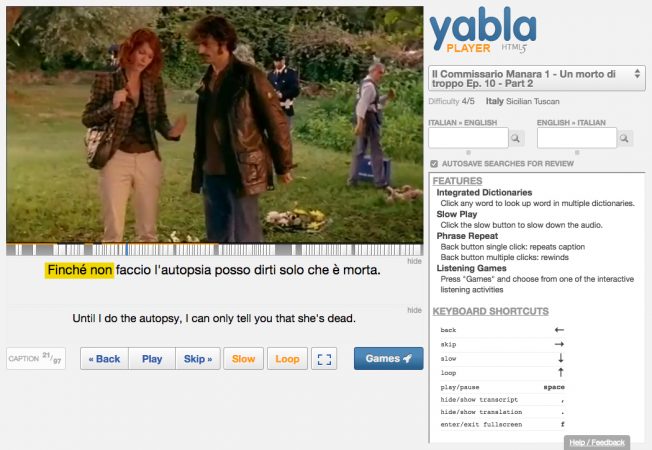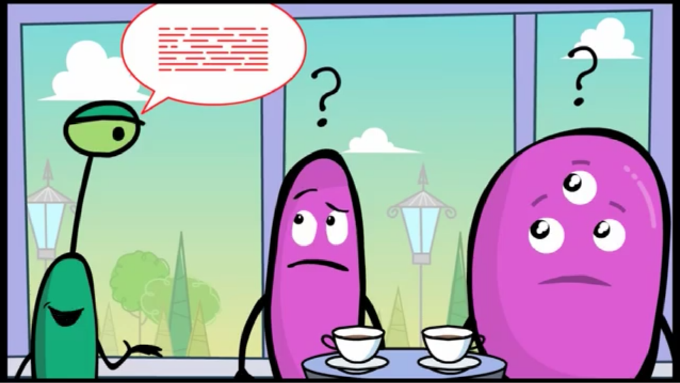Our phrase this week is:
finché non
until (something happens)*
In our episode of Il Commissario Manara on Yabla, the team is at the crime scene and Luca goes to talk with medical examiner Ginevra who says:
Finché non faccio l’autopsia posso dirti solo che è morta.
Until I do the autopsy I can only tell you that she’s dead.
Notice that finché in this context is usually followed by non.1 Literally you are saying:
finché non
as long as not (or while not)
Here’s an example from another episode of Il Commissario Manara on Yabla:
Lei non se ne andrà da qui finché non avrà dimostrato di essere un vero commissario.
You won’t leave here as long as you haven’t shown yourself to be a real chief of police.
Generally, it’s best to just think of the entire phrase finché non as translating to until. When you see finché alone, think as long as or while.
Esempi:
Chiama questo numero finché non risponde.
Call this number until he answers.
(Call this number as long as he does not answer.)
Non voglio sentire un fiato finché non hai finito.
I don’t want to hear a peep out of you until you’ve finished.
(I don’t want to hear a peep out of you as long as you have not finished.
Dobbiamo tenere tutto serrato finché non prendono quel pazzo.
We have to keep everything locked up until they get that crazy guy.
(We have to keep everything locked up as long as they do not get that crazy guy.)
So, what’s going to mess you up with this phrase? There’s just one thing, and it will show up after a few other conjunctions as well. Unlike English – if you use the future tense in the first part of the sentence, you must use the future tense after finché non.2
Ma aspetterò finché non starai meglio.
But I’ll wait until you are better.
(But I will wait until you will be better.)
Aspetterò finché non tornerai.
I will wait until you return.
(I will wait until you will return.)
Staremo qui finché non chiederai scusa.
We’ll stand here until you say you’re sorry.
(We will stand here until you will say you’re sorry.)
A proposito, Italians use the non after finché even in the negative!
Ma non finché non farete un bagno.
But not until you have a bath.
No, non finché non avrai risposto alle mie domande.
No, not until you have answered my questions.
No, non finché non starai meglio.
No, not until you get better.
Confused? With this conjunction, we are getting into more complex language, so that’s to be expected. Don’t panic! Just keep studying phrases. Use the ones that express what you need to express. You’ll see over time you’ll be saying it right and you won’t even know how it happened!
Help us with phrases! How will you use this phrase in everyday speech? Tell us on Facebook.
Wait… what language is THAT?
Yabla Italian is an excellent tool to help you develop an ear for spoken Italian. (I use Yabla personally to study three different languages.) With Yabla Italian you will have:
- verbatim subtitles in Italian
- access to English subtitles when you need them
- the ability to turn the subtitles off as you improve
- quizzes to gauge how well you’re doing
And… this is especially useful… you can slow the video down! Yes! We all know how fast the Italians talk. You know a lot of the words. If you just had a little more time to process them…. Well, now you do!
If you feel your Italian is good enough to watch without Italian (or English) subtitles, this episode of Il Commissario Manara is also available for free from RAI. You will need to fast forward to exactly 48 minutes for the start of Un morto di troppo.
*Note: there are other ways the English word until is translated into Italian. In the context of a particular date you would say, for example, fino a domani (until tomorrow)
1In everyday speech it isn’t always. But don’t worry, context will tell you the meaning.
2You’ll also see finché non (as well as similar conjunctions) followed by the subjunctive.





0 Comments